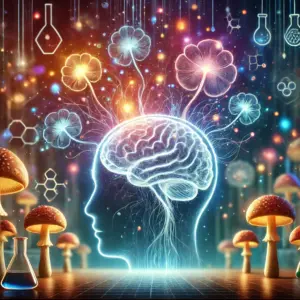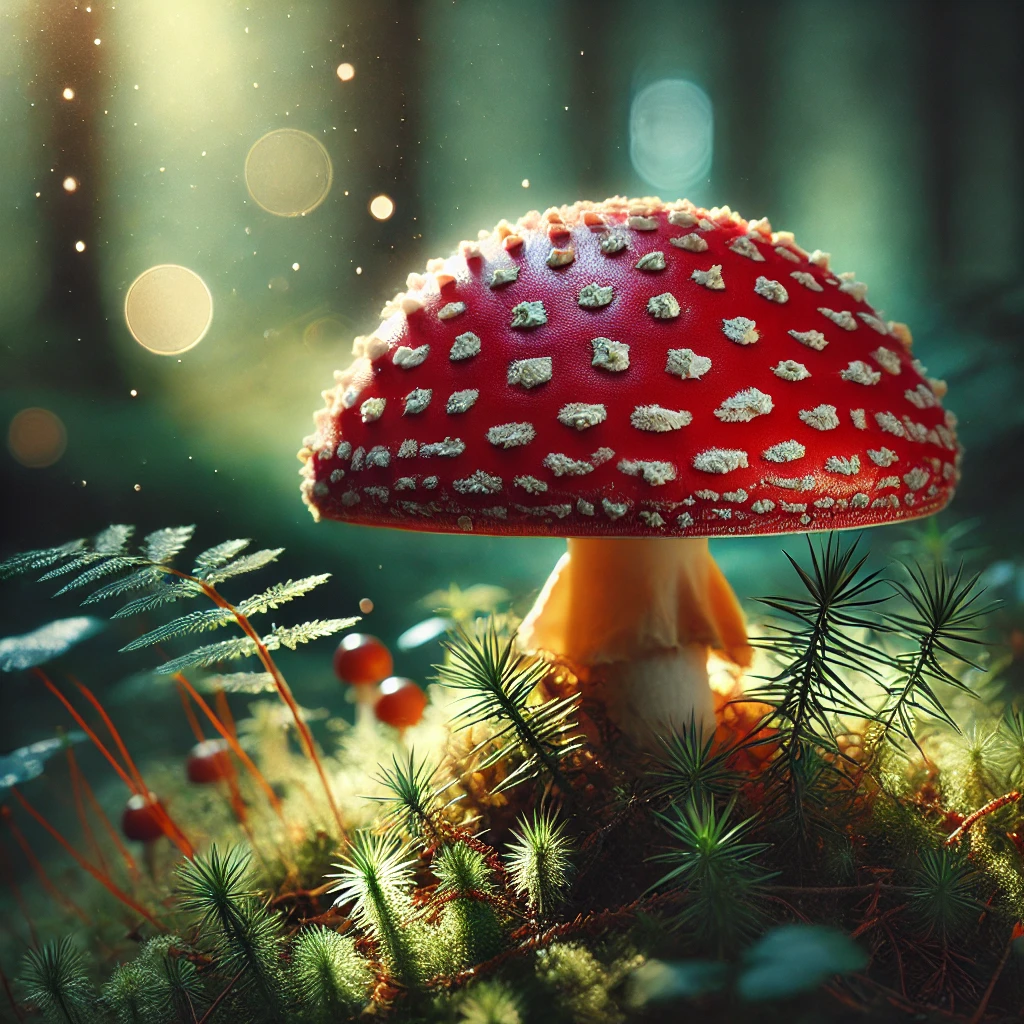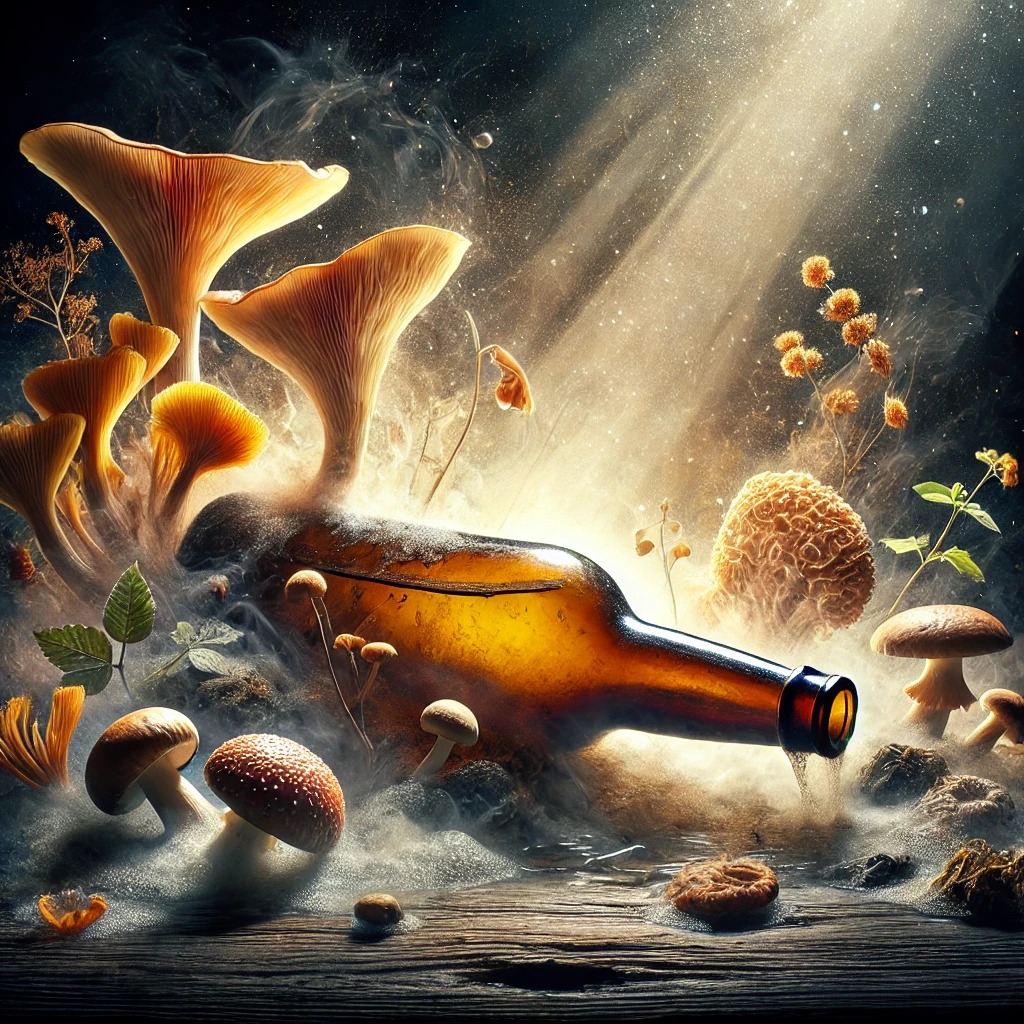Introduction
Have you ever heard of mushrooms that are not only delicious, but also have the potential to help people with certain diseases? Scientists at Johns Hopkins University in the USA are working on researching just that. They are investigating how certain mushrooms affect the human brain and may be able to help with depression, anxiety and other problems. In this article, we take you on an exciting journey into the world of these special mushrooms and explain what the researchers have discovered.
What are psychedelics?
A special type of substance
Psychedelics are substances that can change our perception. This means that they can influence how we see, hear and feel the world around us. One well-known psychedelic is psilocybin, a substance found in certain mushrooms that are often referred to as “magic mushrooms”.
How do psychedelics work?
When people take psychedelics, this can have various effects:
- Altered sensory perception: colors may appear more intense, sounds may sound different.
- New thoughts and ideas: Sometimes people think about things they have never thought about before.
- Emotional experiences: Feelings can be stronger, both positive and negative.
It is important to know that these substances are powerful and their use must be taken seriously.
Why are researchers interested in psilocybin?
Help with mental illnesses
Many people suffer from mental illnesses such as depression or anxiety disorders. Sometimes the usual medication and therapies do not help sufficiently. This is why scientists are looking for new ways to help these people.
Psilocybin as a possible therapy
Studies have shown that psilocybin can bring about positive changes in some people. It can help to break through negative thought patterns and open up new perspectives.
The work of the researchers at Johns Hopkins University
A pioneering center for psychedelics research
Johns Hopkins University is one of the world’s leading centers for research into psychedelics. The team there consists of experienced doctors, psychologists and other specialists.
Important studies and results
1. treatment of depression
In one study, the researchers gave psilocybin to people with severe depression in a controlled environment. Many participants reported that their symptoms improved significantly after treatment.
2. support with fear of death
People with life-threatening diseases, such as cancer, often have a great fear of death. The researchers found that psilocybin can help these people find peace and alleviate their fears.
3. help with addiction problems
Addiction means that someone cannot stop using a certain substance, such as cigarettes or alcohol. Studies have shown that psilocybin has helped some people to overcome their addiction.
How does psilocybin treatment work?
Preparation is everything
Before the participants take psilocybin, they meet with therapists several times. They discuss their feelings, expectations and possible fears.
The session itself
- Cozy environment: The room is pleasantly furnished, often with comfortable sofas and calming decorations.
- Support: Two therapists are present at all times.
- Equipment: Participants wear an eye mask and headphones with soft music.
- Duration: The session usually lasts several hours.
Debriefing
After the session, the participants talk about their experiences. This helps them to understand what they have experienced and integrate it into their everyday lives.
What happens in the brain under the influence of psilocybin?
Altered brain activity
Psilocybin affects certain parts of the brain:
- Networks are reconnecting: areas of the brain that do not normally communicate with each other as much are suddenly exchanging more information.
- Reduced activity in the “default mode network”: This part of the brain is often active when we think about ourselves. Reduced activity can lead to people being less stuck in negative thoughts.
New perspectives
Through these changes, people can:
- Gain new insights: They see their lives and their problems from a different perspective.
- Break through negative patterns: Old habits and thought patterns can be dissolved.
Are psychedelics safe?
Safety measures of the researchers
The scientists attach great importance to safety:
- Selection of participants: Not everyone can take part in such studies. People with certain pre-existing conditions are excluded.
- Controlled environment: The sessions take place in safe rooms with trained staff.
- Support: Participants are accompanied before, during and after the session.
Possible risks
- Unpleasant experiences: Some people may experience anxiety or confusion during the session.
- Important: This is why it is so crucial that such treatments only take place under professional supervision.
What do the results say so far?
Positive feedback
- Improved mood: Many participants report an improved mood and quality of life.
- Long-lasting effects: In some cases, the positive changes lasted for several months or even years.
Scientific recognition
The researchers’ work has been published in many renowned scientific journals and has attracted worldwide attention.
The history of psychedelics research
Early studies
In the 1950s and 1960s, scientists began researching psychedelics. However, due to legal changes, research was later severely restricted.
Resurgence of research
In recent years, there has been a renewed interest in psychedelics in medicine. Thanks to strict safety protocols and new technologies, researchers can now better understand how these substances work.
What could the future look like?
New therapeutic approaches
- Combination with psychotherapy: Psilocybin could be used as part of a comprehensive therapy.
- Treatment of other illnesses: Researchers are investigating whether psilocybin can help with other illnesses, such as obsessive-compulsive disorder or eating disorders.
Legal changes
- Adaptation of the laws: If the positive effects are confirmed, laws could be adapted to enable medical applications.
Important questions and answers
Is psilocybin legal?
- Current status: Psilocybin is illegal in many countries. The researchers have special permits for their studies.
- Medical use: Some countries are examining whether psilocybin can be approved for medical purposes.
Can everyone benefit from psilocybin?
- Individual differences: Not everyone reacts to psilocybin in the same way. It is therefore important who is allowed to participate and how the treatment is carried out.
- Professional support: Risks can occur without the right support.
Why is this research important?
Hope for many people
- Alternative treatment options: Psilocybin could offer a new opportunity for people for whom conventional therapies do not help.
- Understanding the brain: Research helps us to better understand the brain and develop new therapies.
Social impact
- Destigmatization: If psychedelics are recognized as medical tools, this could reduce prejudices.
- Scientific progress: New findings could also be useful in other areas of medicine.
A look inside the sessions: How do the participants feel?
Personal experiences
Some participants report on:
- Feeling of connectedness: You feel more connected to the world and to other people.
- Deep insights: Some people realize things about themselves that they were not aware of before.
- Emotional release: Old pain or grief can be processed.
Example story: Anna’s experience (fictional)
Anna, 35 years old, had been suffering from depression for years. No therapy really helped her. She was given psilocybin in a study under professional supervision. During the session, she felt a deep sense of calm and saw her life from a new perspective. After the treatment, she reported a significant improvement in her mood and enjoyment of life.
The role of the therapists
Support and guidance
- Preparation: They help the participants to mentally prepare for the session.
- During the session: They ensure safety and intervene if necessary.
- Follow-up: You provide support in processing the experiences.
Training and expertise
The specialists are specially trained to deal with the special requirements of this form of therapy.
What do critics say?
Concerns and challenges
- Long-term effects: There are still questions about the long-term effects of psilocybin.
- Potential for abuse: Without proper control, psychedelics could be abused.
- Ethical issues: How can we ensure that all treatments are carried out responsibly?
Answers from the researchers
- Ongoing studies: Further research is being carried out to clarify unanswered questions.
- Strict protocols: The safety of the participants has top priority.
- Transparency: Results are communicated openly in order to build trust.
How can parents talk to children about this topic?
Education and enlightenment
It is important to talk openly about such issues:
- Simple language: Explain what psychedelics are and why they are being researched.
- Emphasize safety: Emphasize that such substances should only be used under professional supervision.
- Answer questions: Be prepared to answer questions and learn more together.
Conclusion
Research at Johns Hopkins University shows that psilocybin has the potential to help many people. Although there is still much to learn, these discoveries could change medicine. It is fascinating to see how a natural substance from mushrooms can open up new avenues in the treatment of mental illness.
Further resources
Books and articles
- “The New Science of Psychedelics”: A book that explains current research in an understandable way.
- Children’s encyclopedias: Look together in age-appropriate encyclopedias for information about the brain.
Websites
- Johns Hopkins Center for Psychedelic and Consciousness Research: Official site with information on current studies.
- Child-friendly science pages: Websites that explain scientific topics for children.
Important notes
- Not to be imitated: Psilocybin is a powerful substance and must not be taken without professional supervision.
- Observe legal regulations: Find out about the laws in your country.
- Consult specialists if you have any questions: Talk to doctors or therapists if you want to know more.
Final thoughts
Research into psychedelics such as psilocybin is still in its infancy, but the results so far are promising. With further studies and a responsible approach, we could develop better treatments for many mental illnesses in the future. It’s an exciting example of how science and nature can come together to improve the lives of many people.
Thanks for reading! If you want to find out more about this topic, talk to your parents or teachers. The world of science is full of wonders, and who knows – maybe one day you will be part of such exciting discoveries yourself!
This article was written to make complex scientific topics understandable for younger readers. All information is based on current research and is for educational purposes.




